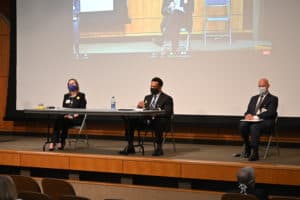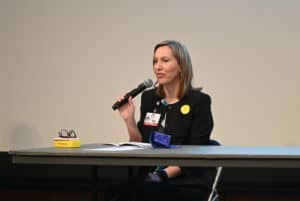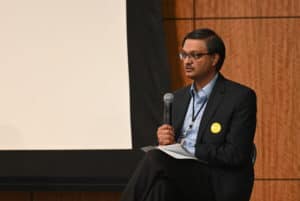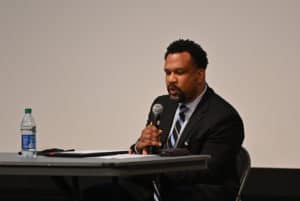COVID-19, Finances and Racism Focus of Chancellor’s Town Hall
| Chancellor Cam Patterson, M.D., MBA, and members of senior leadership discussed COVID-19, the university’s finances and efforts to combat racism during a June 10 Town Hall webinar.
Patterson told Team UAMS he wanted to have a “conversation about the stresses we’re facing and what we’re doing to address those stresses.”

Amanda George, Brian E. Gittens, Ed.D., and Mark Williams, Ph.D., were panelists at the June 10 Town Hall.
Those stresses include the COVID-19 pandemic, which is a medical crisis unlike any we have experienced in a century, the pandemic’s negative impact on UAMS finances and the racism illustrated by the death of George Floyd in Minneapolis, he said.
There are things to celebrate, he said, recognizing research for a 40% increase in funding support this year and applauding the colleges for their work to ensure the safety of students and faculty.
“We also can celebrate the reopening of our clinics and operating rooms,” he said, adding, “we are working to ensure our clinical spaces are the safest places to be.”
But there is no denying that the COVID-19 pandemic has been difficult for UAMS, especially at a financial level, Patterson said.
“Our goal has been to prevent the furloughs and layoffs that we have seen at other health care providers around the state,” he said. “We don’t want to go through the same things we went through in 2018. We are doing all we can to prevent that.”

Amanda George, vice chancellor for finance and administration and chief financial officer, shares the impact COVID-19 had on UAMS’ bottom line.
Efforts to improve the financial picture included mandatory and voluntary reductions in hours that saved $3.2 million in May, Patterson said. Structural reorganizations eliminated 15 positions. Cabinet officials also have taken a minimum of 20% salary reductions during this difficult time, he said.
Amanda George, vice chancellor for finance and administration and chief financial officer, shared more details on the institution’s finances. In April, UAMS was down 29.5% for inpatient discharges, down 52.1% for clinic visits and down 62.8% for surgical cases, resulting in an $18.7 million loss for the month — a number that would have been worse if UAMS hadn’t received $16 million in federal CARES Act funding.
“We will see a gradual climb in all of the areas over the coming months, but it will take a while for us to get back to normal,” she said. “We expect COVID will impact our finances through the first quarter of the 2021 fiscal year.”
In addition to the cost-saving measures that Patterson outlined, UAMS instituted a hiring pause in March as well as a freeze on discretionary spending, George said.
“We’ve done a lot of hard work to address the financial crisis,” she said, adding that UAMS is applying for available external funding from the state and federal government.
George also announced UAMS had received payment that morning from the Arkansas Department of Human Services to distribute to front-line workers.

Keyur Vyas, M.D., associate professor in Internal Medicine’s Division of Infectious Diseases, urges employees to remain vigilant as the number of COVID-19 cases climb in Arkansas.
Mark Williams, Ph.D., dean of the College of Health Professions, and Keyur Vyas, M.D., associate professor in Internal Medicine’s Division of Infectious Diseases, addressed the pandemic.
Williams shared with Team UAMS the infection models COPH faculty have developed. They predicted a steady increase in infections in Arkansas, reaching 3,000 hospitalizations by October, 150,000 active cases by October and 1,200 new cases per day by the end of September.
He stressed that the long-range forecasts should be interpreted as, “If all conditions stay the same, we will see a steady and rapid increase in the number of cases through early October, when we will begin to see a gradual decrease.”
Vyas said UAMS has admitted 92 patients with COVID-19.
“Our workers have adapted to numerous changes to protect our personnel and our patients,” he said, adding that UAMS is a safe environment because of the precautions being taken by UAMS team members.
“The number of infections is increasing and will likely continue to increase, so it is important we are careful and vigilant,” Vyas said. “The measures we take to prevent the spread of infection are likely to be with us for the foreseeable future.”

Brian E. Gittens, Ed.D., M.P.A., vice chancellor for Diversity, Equity and Inclusion, urges employees to help combat systemic racism.
Brian E. Gittens, Ed.D., M.P.A., vice chancellor for Diversity, Equity and Inclusion, addressed UAMS’ efforts to combat systemic racism.
“We often have a moment of silence, but we’re going to do something different because we’ve been silent for too long,” he said, as he asked the crowd to take a deep breath and only exhale when he gave the command.
After about 15 seconds, he allowed everyone to exhale, saying, “I can only imagine what eight minutes and 46 seconds felt like for George Floyd.”
Gittens said UAMS is working on mandatory diversity training for faculty and staff, creating safe spaces to address racial discord and supporting a student-led awareness effort at the fountain.
“UAMS is not just about beautiful building and state-of-the-art facilities. It is about Team UAMS – its heart and soul,” he said.”
Patterson and the leaders then answered questions from audience members — both in the Spine Institute’s auditorium and on Zoom. Employees asked questions about the daily COVID screening, hiring freeze, faculty promotions, CARES Act funding, DHS payments, working from home, employees participating in protests, travel restrictions and more.
A video of the Town Hall, including the question and answer session, is available on the UAMS intranet.
